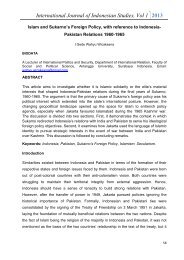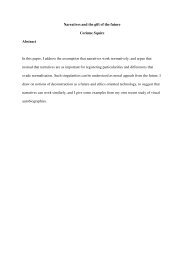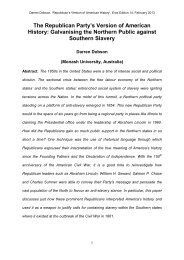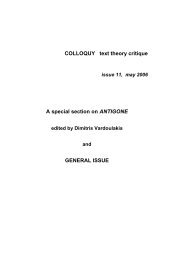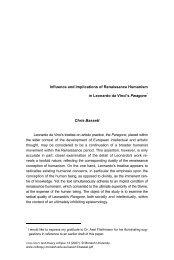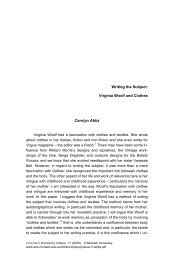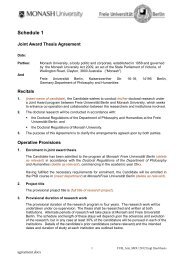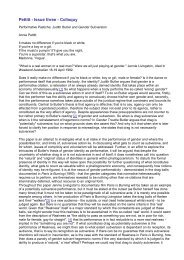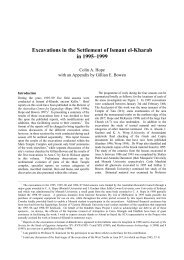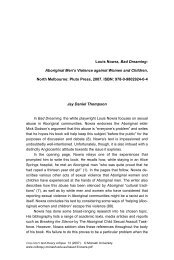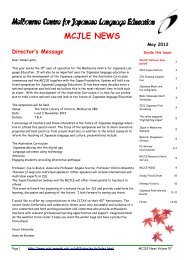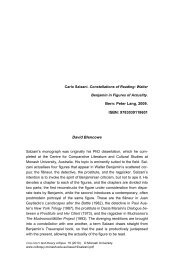░ <strong>The</strong> <strong>Acknowledgement</strong> <strong>of</strong> <strong>Love</strong> <strong>in</strong> <strong>Sarah</strong> Ruhl’s <strong>Drama</strong> 17from the world is doomed, a relation that acknowledges the separateness<strong>of</strong> each <strong>in</strong>dividual <strong>in</strong> the world may fare better. Cavell arrives at this suggestionafter th<strong>in</strong>k<strong>in</strong>g about a spectator’s experience <strong>of</strong> watch<strong>in</strong>g the play <strong>in</strong>a theatre. Though spectators are physically separated from the characterson stage, they can put themselves <strong>in</strong> “their present.” 34 <strong>The</strong> act <strong>of</strong> plac<strong>in</strong>goneself <strong>in</strong> the same present as the characters demands that oneacknowledge one’s vulnerability: “I am hidden and silent. In a word, thatthere is a po<strong>in</strong>t at which I am helpless before the act<strong>in</strong>g and suffer<strong>in</strong>g <strong>of</strong>others.” 35 Cavell’s claim is that the experience <strong>of</strong> watch<strong>in</strong>g or read<strong>in</strong>g a playlike K<strong>in</strong>g Lear is an experience analogous to love: “what is revealed is myseparateness from what is happen<strong>in</strong>g to them [the characters]; that I am I,and here. It is only <strong>in</strong> this perception <strong>of</strong> them as separate from me that Imake them present. That I make them other and face them.” 36 Lear’s problemthroughout the play is that he is unable to face Cordelia, to see her assomeone other than his projection <strong>of</strong> her, and to open himself to her lovefor him.Follow<strong>in</strong>g Cavell’s read<strong>in</strong>g <strong>of</strong> K<strong>in</strong>g Lear, I would like to suggest thatwhat Eurydice and Cordelia have <strong>in</strong> common is an unsusta<strong>in</strong>able—albeitheart-rend<strong>in</strong>g—relationship with their fathers that avoids the acknowledgment<strong>of</strong> an <strong>in</strong>expressible (or, <strong>in</strong> Mathilde’s sense, dirty) love. Both playsend with the dashed fantasy <strong>of</strong> an otherworldly union. But <strong>in</strong> dash<strong>in</strong>g thisfantasy, the plays open the way for a more endur<strong>in</strong>g love, which alwaysruns afoul <strong>of</strong> adequate representation. Cavell says <strong>of</strong> Cordelia: “All herwords are words <strong>of</strong> love; to love is all she knows how to do. That is herproblem, and at the cause <strong>of</strong> the tragedy <strong>of</strong> K<strong>in</strong>g Lear.” 37 Certa<strong>in</strong>ly, part <strong>of</strong>Cordelia’s problem <strong>in</strong> the open<strong>in</strong>g scene is that it is impossible for her tospeak her love truly <strong>in</strong> the theatrical sett<strong>in</strong>g her father has set up. After hersisters claim to love Lear above all else, Cordelia is speechless:<strong>The</strong> truth is, she could not flatter; not because she was too proud ortoo pr<strong>in</strong>cipled, though these might have been the reasons, for a differentcharacter; but because noth<strong>in</strong>g she could have done wouldhave been flattery—at best it would have been dissembled flattery.<strong>The</strong>re is no convention for what Cordelia was asked to do. It is thatGoneril and Regan have taken the words out <strong>of</strong> her mouth, but thathere she cannot say them, because for her they are true (“Dearerthan eye-sight, space and liberty”). She is not disgusted by her sisters’flattery (it’s noth<strong>in</strong>g new); but heartbroken at hear<strong>in</strong>g the wordsshe wishes she were <strong>in</strong> a position to say. 38<strong>The</strong> sett<strong>in</strong>g <strong>of</strong> this scene—Lear’s court, filled with spectators—serves tohighlight the impossibility <strong>of</strong> represent<strong>in</strong>g love <strong>in</strong> theatre. Cordelia is aware
18Thomas Butler░<strong>of</strong> this problem when she expresses her <strong>in</strong>itial strategy to deal with Lear’slove test: “What shall Cordelia speak? <strong>Love</strong>, and be silent.” 39In Ruhl’s drama, too, we can observe an acknowledgment <strong>of</strong> a lovethat skirts expressivity. First, as we have seen, love articulated as visions <strong>of</strong>a union <strong>of</strong> <strong>in</strong>dividuals fails:Charles: Ana has been <strong>in</strong> my genetic code. (CH, 62)**********Orpheus: Your hair will stand on end as it plays my music and becomesa hair orchestra. (CH, 339)**********Father: We two alone will s<strong>in</strong>g like birds <strong>in</strong> the cage. (CH, 377)What counts as a more powerful love, on the other hand, evades representation.Recall the scene, cited earlier, <strong>in</strong> <strong>The</strong> Clean House when Lane forgivesAna:<strong>The</strong>y look at each other.Lane forgives Ana.Ana: Want an apple?Lane: Sure. (CH, 93)In the context <strong>of</strong> Lear’s avoidance <strong>of</strong> be<strong>in</strong>g seen, Lane and Ana’s mutualrecognition here is significant. <strong>The</strong>y see each other as separate from themselvesand follow Cordelia’s advice—“<strong>Love</strong>, and be silent.”Eurydice is even more sceptical than <strong>The</strong> Clean House <strong>of</strong> the possibility<strong>of</strong> express<strong>in</strong>g love. <strong>The</strong> two love-relations—Eurydice and Orpheus, andEurydice and her father—are doomed. But each is unsusta<strong>in</strong>able because<strong>of</strong> its escapist predilection (the open<strong>in</strong>g scene <strong>of</strong> the play ends with Eurydiceand Orpheus rac<strong>in</strong>g from the beach—from grounded reality—to thesea). What’s miss<strong>in</strong>g <strong>in</strong> these relationships is an acknowledgment <strong>of</strong> theworld, which <strong>in</strong>cludes other people and other relationships. Just as Learnever asks Cordelia about her husband, Orpheus never asks Eurydiceabout her father. <strong>The</strong> play suggests that if love is go<strong>in</strong>g to survive, it needsto be open to and affected by other love relations, particularly <strong>in</strong> this caserelations with the dead. Derek Goldman, director <strong>of</strong> a 2009 production <strong>of</strong>Eurydice, says: “<strong>Sarah</strong> [<strong>Ruhl's</strong>] faith [is] <strong>in</strong> the idea <strong>of</strong> death as not an end<strong>in</strong>gbut as a space <strong>in</strong> which a relationship that may not feel resolved cancont<strong>in</strong>ue to unfold. That's the gesture <strong>of</strong> this underworld even if it's a temporaryspace that has to be left <strong>in</strong> the end.” 40 Similarly, Vogel comments onthe centrality <strong>of</strong> death to Ruhl’s theatrical vision: “<strong>Sarah</strong> is go<strong>in</strong>g back to an



